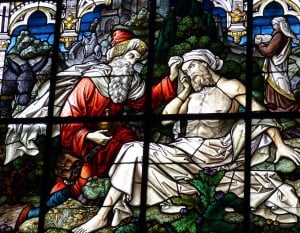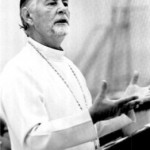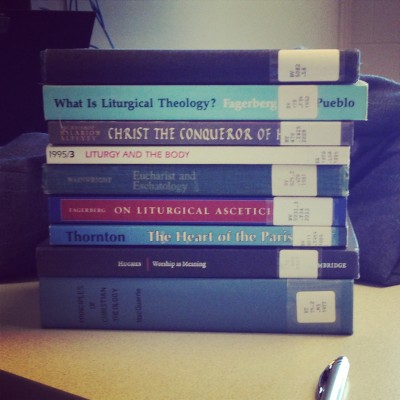If you’re new to my Sermon Notes, you can read about why I prepare them here. They aren’t just for preachers, they’re for everyone!
Thesis
What is the content of true religion? Evangelicals seem to loathe the term “religion” and instead favor the concept of relationship when talking of Jesus. As you will see below: I loathe this false dichotomy. Religion in and of itself is not bad. Christianity is a religion and rather than throwing the baby out with the bath water, we should seek to understand the meaning and claims of true religion and see that we have both religion and relationship in and through the person and work of Jesus Christ. True religion will always yield fruitfulness and point toward the inheritance into which we have been grafted.
Analysis
Collect
Lord of all power and might, the author and giver of all good things: Graft in our hearts the love of your Name; increase in us true religion; nourish us with all goodness; and bring forth in us the fruit of good works; through Jesus Christ our Lord, who lives and reigns with you and the Holy Spirit, one God for ever and ever. Amen.
“Graft in our hearts…” This phraseology should be particularly poignant to those of us Gentiles who have been grafted into the branch of Jesse, into David’s line, into the household and family of YHWH based on the merits and love of Jesus. We have done nothing to deserve inclusion in God’s family—nor can we ever earn that which we have been given—therefore to be grafted is to be given a gift. This prayer first seeks the grafting of love from the Father into our hearts but it is still the responsibility of the individual to do good and right with that which has been given. We are passive in that this love originates not from us but we are active in that we have responsibility to embrace, share, and grow it afterward. Ultimately the act of loving God is not something that begins with us but rather it flows from the love of God and we in turn offer that same love back to Him in worship.
“Increase in us true religion…” I’ll be honest: I am greatly offended by all of this talk about “relationship versus religion” from various corners of Christianity. This false dichotomy is neither helpful nor accurate. Religion is not a bad thing! Bad religion is bad and we can see throughout the pages of Scripture and human history that religion can turn to evil and beget more evil in this world. However, this prayer points to the reality that there is good religion and Christianity is that good and true religion. But what does it look like? That is a different question entirely. I think that true religion is the right and proper worship of the triune God in both spirit and truth. I think that true religion is the conviction that our relationship with Jesus of Nazareth calls us to right worship and right living and far exceeds the confines of emotion or personal friendship. I believe that true religion is the understanding that our entire lives are to be offered to the Lord as our spiritual act of worship and that there can be no separation of the sacred from the “profane” or the private from the public because: when Jesus is Lord nothing else matters!
The fruit of God’s love and true religion will be good works. Simply put: to follow Jesus is to know him, to act as he has commanded, and to be agents in the world he loves. If religion does not lead to fruitfulness then it is not true. True fruitfulness is the extension of God’s kingdom.
Old Testament – Deuteronomy 4:1-2, 6-9
Israel’s leader and deliverer, Moses, is giving one of his last addresses before dying. He has just seen Canaan from the top of Mt. Pisgah but will not be able to enter the Promised Land due to his disobedience recorded earlier in the Exodus narrative. The content of his speech offers an appropriate bookend to his leadership over Israel for it was at Sinai that he first relayed Torah to the people and called them to covenant obedience and faithfulness. It is here at Pisgah that he reminds them of all that YHWH has commanded and lays out before them the paths of obedience and disobedience. In Exodus 20, Torah was given by YHWH to a people already redeemed; in Deuteronomy 4, Torah is once again given to a people already redeemed and this time to a people about to receive her inheritance.
Notice the phrase in verse 1, “So that you may live to enter and occupy the land.” This is the very thing that Moses is not able to do because he was disobedient! Moses calls all of Israel to covenant faithfulness and Torah obedience because he knows it to be the way of life! Indeed that is the entire point of the Promised Land: to enter, occupy and live abundantly in it! It was not given by YHWH to Israel to be a possession set aside in a safety-deposit box or to be gawked at as art hanging on the wall, but to be enjoyed and used to His glory. Israel had already been punished by wandering in the desert for 40 years due to her inability or complete defiance to not enter the land; an entire generation of Israelites died out because they had refused to trust YHWH’s promises. The very act of entering and occupying the Promised Land is a great feat in Israel’s long history.
During his Sermon on the Mount, Jesus declares that he has not come to abolish the law or to change an iota of it but to fulfill the law. Sounds very similar to what Moses says in verse 2, right? Torah is not to be added on to or subtracted from but to be lived out in holy fear and trembling and godly joy before the Covenant-Maker-and-Keeper.
Moses reveals the public benefit of the law: other nations and other peoples will take note of Israel’s lifestyle and will begin to wonder about her God. To live Torah is to live in YHWH’s kingdom as a covenant family member. To live Torah is to demonstrate in word, act, and habit the goodness and faithfulness of the God of Abraham, Isaac, and Jacob. For Israel the question was, “Does your life point to YHWH? Are you revealing YHWH in all you do?” For the Church the question is similar, “Does your life point to Jesus the Christ? Are you revealing the triune God through your every fiber of your being?” The answer should be yes, but we need to intentionally take every moment captive through the power of the Holy Spirit to live as God has called us to live.
Psalm 15
In the context of this set of lectionary readings, particularly based on the passage from Deuteronomy, I see Psalm 15 as a beautiful image depicting a life of faithfulness over a life of disobedience. Said differently, Psalm 15 answers the question, “What does it look like to keep Torah?” Not perfectly but intentionally.
The opening verse of Psalm 15 hits on two major themes and concepts in Israel’s spirituality. The tabernacle was YHWH’s dwelling place, it was where he resided during the years of wandering in the desert before they entered the Land. The Temple in Jerusalem—YHWH’s holy city on a hill—where the LORD was powerfully present for generations then replaced the tabernacle. The temple became the meeting place of heaven and earth, the place where YHWH was most powerfully and particularly present in, with, and amongst His people. So for verse 1 to ask these questions is to really ask, “Who can dwell with YHWH?”
Of course only the righteous can dwell with YHWH! The psalmist goes on to describe what the righteous person does or does not do, but the point is clear: to be righteous is to dwell with YHWH. Now, we know through Paul’s writings—yes, I am bringing that up—that we are made righteous through the covenant faithfulness of the Faithful Israelite, Jesus. We can do nothing to merit our righteousness whatsoever! Jesus adopts, yea grafts!, us into his covenant family through his own righteous acts and love. The result is still the same, however: righteousness necessitates and requires righteous living.
The list provided by the psalmist should therefore still serve as a litmus test for Christians: is guile upon my tongue? Do I do evil to my friends? The list doesn’t earn our adoption but it certainly does prove that our adoption into God’s family is bearing good fruit. It is a subtle yet significant change to suggest that Christ has affected a change within us that we might begin living out our salvation in fear and trembling. I’m not “looking” for Jesus in the Old Testament here, I just happen to think that our concepts of righteousness need to match up with the person and work of Christ rather than our preconceived notions of merit and/or imputation.
Epistle – James 1:17-27
For Track 2, James is the next canonical book on offer and the RCL has us skipping the opening 16 verses. While it feels a bit disjointed to be thrown into another book without much context, I am no longer bothered by the lack of biographical material being provided for James. To be blunt, I don’t particularly care who James was because I don’t think it influences his words terribly much. I’d rather examine and unpack the words written rather than attempt to dissect the identity of the writer. That being said, I certainly have strong opinions as to who James was, to whom he wrote, and why he wrote this epistle, but they are secondary compared to the text that is authoritative and canonical. I’ll step off of my soapbox now…
After a brief introduction, James begins immediately by telling his readers/listeners that every good gift comes from the Father. The arrangement of verse 17 makes it clear that his following argument hinges upon this idea. He moves into claiming that we are first fruits of his creatures through the work of the “word of truth.” That is, through the work of Jesus we have been made—no, we have been given the gift—anew, afresh, and transformed into new creatures.
James pivots from the gift(s) of God and moves into an exposition on righteous living. If we peek at the end of this pericope we can already see the summit toward which he is heading: true religion. Our actions matter because it is not only a relationship with Jesus to which we are called. We are called to live in the here and now as God’s kingdom citizens, his disciples, his pilgrim people, his covenant family by obeying his commands, furthering his reign, and glorifying him with our hearts, hands, and heads.
We are to put away our anger and sordidness and instead embrace meekness. Actually, we are to “welcome with meekness the implanted word that has the power to save our souls.” This beautiful verse packs an important theological punch and it is tied directly to our opening Collect. The word of truth in verse 17 is the logos, the second person of the Trinity, and it is through the divine logos and the written word (Scripture) that we are to know truth and to be saved. However, we do not come to this word on our own: it must be implanted or given or grafted onto our hearts. The bottom line is clear: with meekness and humility we are to accept the gifts of God rather than assuming we have merited his love or favor.
Now we get to the real crux of the matter, the real content of true religion: be doers not hearers. Christ calls us to action rather than comfort, to radical discipleship rather than armchair Christianity. To hear and not do is to miss the point entirely. No, it is worse than that. To hear and not do is to understand and yet refuse to act, and in refusing to act we demonstrate that we don’t really believe at all. Action is the necessary, logical, and only response to faithful listening.
“The law of liberty” is a fun phrase laced through the epistles of the New Testament and it can also be translated as “the law of Christ.” The thinking is that in Christ there is total and absolute freedom. It is not freedom to do whatever we please that grace may abound, but freedom to love and serve Christ and to love and serve our neighbors. We are free from the bondage of sin, death, and the devil; we are free in the love of Christ; we are free to give generously and love radically; and we are free to begin working out our salvation in fear and trembling in the assured knowledge and hope that “Christ has died. Christ is risen. Christ will come again.” Be sure that you don’t misinterpret this phrase and take it to mean some sort of antinomianism that allows the believer to do whatever he or she wants because we serve a gracious God. We DO serve a gracious and loving God but the meaning here is that in Christ we are free to love and serve all.
To be “religious” or “spiritual” is a far different concept than that of true religion. Our true religion in the shadow of the cross and empty tomb is one of both understanding and action, of faith and deed, of love in thought and motion. When we hear God speak lovingly of the poor, the widowed, the orphaned, the hurt, the sick, the oppressed, the unloved, the least, the last, the lost, the broken, the unwanted, the dying, and the defenseless we should know immediately that we are called to love as He would love, to give as He would give, and to serve as He would serve. I’m going to cut this off here and come back to the same concepts in my thoughts on the Gospel lesson and my Synthesis at the end, but suffice it to say that we are to be both hearers and doers.
Gospel – Mark 7:1-8, 14-15, 21-23
This passage from Mark is of great significance contextually and theologically. First, it would be too easy and too cheap a shot to chalk this encounter up to the stringent rules of the Pharisees. If we are to paint the Pharisees with the brush of “religion” then we are to miss the point entirely. Borrowing from N. T. Wright and Tommy Givens—two NT rock stars—we need to understand why the Pharisees were upset. You see, the Pharisees were protecting the religious norms and traditions of Israel. It would not be too much to claim that the Pharisees were protecting the very fabric of Israelite existence. Were they misguided at times? Were they too zealous? Did they miss the Word in front of them? Yes to all of the above, but their motivation was to serve YHWH through keeping Torah to the best of their ability and to call all of Israel to do the same. We should feel sympathy toward their cause, perhaps even identify with them, and realize that their ultimate task was the right and proper worship of YHWH.
Therefore, Jesus’ decisions to fulfill the law differently than the Pharisees envisioned was one of the reasons he was executed on a cross: he challenged the fabric of Jewish society and those who were responsible for leading the people. Jesus disturbed the comfortable and convicted the wayward. This pericope is one example amongst many of his tussles and struggles with and against the religious establishment of the day. Please hear this: he was not wrestling with religion but with poor religious leadership.
The Pharisees are concerned because Jesus’ disciples don’t wash their hands. They think that Jesus’ disciples are defiling themselves by what they touch and/or what goes into their bodies. When questioned about it, Jesus offers the paradigm of what goes in versus what comes out. He suggests that the heart condition is more important than outward and visible signs of piety.
In quoting the prophet Isaiah, Jesus makes abundantly clear that what flows from our lips or hands means absolutely nothing if our hearts are not first drawn to God. Offering mere mental assent or having the right answers a la Sunday School is meaningless without the love of God. Actions such as serving the poor and the homeless without the love of God are merely social services that any non-profit or human being can do. Serving the poor in and with the love of God as He loves is exactly that to which we are called.
Notice the list of sins at the end of this pericope: while there are twelve items in the list, it pairs nicely with the Ten Commandments. Jesus is claiming that failure to keep the law from Moses (read the whole of Mark 7 to see references to Moses) results in defilement and sinfulness. Our fruit and righteousness will be seen not based only on the words from our lips but on the whole of who we are.
I am not aware of anywhere in Scripture where we are told that sacrifices of meat are wrong or bad. I know that in the Old Testament YHWH said he desired a pure and contrite heart over a sacrifice but it was because sacrifices with dirty hands and an impure heart was meaningless. Their worship wasn’t vain because it was “religious” but because their hearts were far from God. So too, Jesus isn’t claiming that we are to give up on the “outward appearances” in order to focus solely on the “inward.” No! Jesus is telling his followers that our hearts need to be near to God and that our lips and hands need to proclaim his goodness. To be kingdom citizens is to live according to Christ’s commands.
Liturgical Considerations
After an extended journey through the Bread Discourse of John 6, we find ourselves back in the middle of Mark’s gospel. While the texts for this Sunday have to do with the meaning or fruit of true religion I don’t find a whole lot to translate liturgically. My advice, if you remember, at the beginning of the move from Mark into John was to reflect this important transition by selecting a different Eucharistic prayer—if possible—for the duration. My advice to you now, if you made that initial switch, is to switch back to the Eucharistic prayer you were using originally for Ordinary Time.
Before we know it we will be arriving at Christ the King Sunday and then Advent; that is, Ordinary Time has not yet run it’s course but we are in the second half of our excursion through Mark toward Advent and this can/should be reflected liturgically. Take the time to sit down this week and map out your sermons and liturgy for the next 2-3 months as we prepare to approach the babe who would be King. Think through the significance of Advent preparation in the spiritual formation of your parish and the theological implications for your sermons. Read through the rest of Mark’s gospel in one sitting to begin putting the pieces of the puzzle together in order to offer a narrative preaching approach. Start arranging and rearranging liturgical elements like the Prayers of the People to reveal the weekly and seasonal changes on the horizon.
Synthesis
There is indeed such a thing as true and good religion. As followers of the Crucified and Risen One we are called to be a relationship and to true religion. The triune God desires our hearts, for He has written his law upon them, but He also desires our actions and lives to proclaim outwardly that which we know inwardly. To borrow from Jesus: we will be known based on the fruit that we bear. A good tree bears good fruit. Period. If the fruit of our lives—our religion—is poor then there is a heart condition with which we need to deal.
Let us put aside all foolish talk of this false dichotomy between relationship and religion. It isn’t helpful and it isn’t true. Our encounters, both privately and corporately, with the Living God must lead to right living, to covenant keeping, to Torah obedience, to faithfully adhering to the law of Christ. True religion is gift from God because the knowledge of His love and nourishment by His goodness are pure gift. He is the Father of lights from whom all things flow and as we seek and strive to love Him fully we will be drawn into loving and serving others. Call people to true religion this Sunday! Call them to be hearers (relationship) and doers (religion) for you cannot have one fully without the other. Just as faith without works is dead, so too is religion without love and vice versa. Let us see true religion as that which comes out of us: it can either defile us or speak to the righteousness of Christ living in us.













